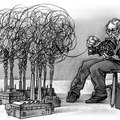FIRST there were boutique hotels — small, private, luxurious and impressive. They were expensive, but that was not an issue for the people frequenting them.
Now they are settings for boutique business meetings, where executives are cosseted, achievers are rewarded and group identity encouraged. These hotels are also meant for no more than a few dozen people, often those doing the most important work.
In such exclusive settings, these people are likely to feel appreciated and worthy of more than a PowerPoint presentation, a lunch of chicken and cheesecake, a nondescript room and the anonymity of a large hotel.
The day might start with a multicourse breakfast of fresh fruit and omelets at the Mill House Inn in East Hampton, N.Y., where guests can brainstorm in a living room with a fireplace, do some quiet thinking nearby while gazing at the Atlantic Ocean, relax in a whirlpool bath and sleep on feather beds.
Guests have “the feeling that they’re important, they’re valuable and that we splurged on you,” said Christina Wilkes, who oversees business-travel consulting at American Express Business Travel Advisory Services.
A small hotel or inn is ideal for a group of 50 to 60 people when their host “wants to leave the attendee with a great impact, make it memorable, make it different, make it stand out,” she said.
At a big hotel, that size group might rattle around in a room far too big or sterile. Even more worrisome, a competitor could get wind of the meeting, eavesdrop outside the door or buttonhole a participant in a corridor.
“When you start looking at a boutique hotel, you’re purposely doing it to avoid the big-hotel feeling,” said Kurt Paben, vice president for business development at Carlson Marketing, an international conference planner.
At boutique hotels, meetings can be almost as much of an adventure as a vacation.
To get to the Harrison House Suites, in the San Juan Islands off the coast of Washington, guests can take a ferry or a seaplane. At Porches, a small hotel in North Adams, Mass., tours are set up for corporate guests to visit the Massachusetts Museum of Contemporary Art across the street. Elsewhere, guests wind up a day’s work with a trip to a vineyard followed by a gourmet dinner, cooked by the guests themselves.
Companies choose boutique properties because of their reputations for attracting the rich and famous. That is especially true in vacation spots like the Hamptons or New England.
The idea that their site has been mentioned in gossip columns and celebrity Web pages can help excite employees about having a meeting there, Mr. Paben said. “They get to stay at a hotel that X Y Z celebrity stayed at,” he said, adding that such excitement leads to “buzz, pride, bragging rights, that kind of thing.”
Boutique hotels are marketing themselves as ideal for small meetings within big companies, like board meetings, Mr. Paben said; they are also courting entrepreneurs who need alternatives if their companies have outgrown the office conference room.
When a company is planning a meeting that might draw attention from the news media, elegance and an air of exclusivity can be helpful, say, for introducing a new car.
In that case, Mr. Paben said, his clients are looking for a place that “supports the lifestyle of the owner and ties it all together.”
But sometimes the goal is not to be seen by competitors or the public. That is attractive for remote spots like the Harrison House Suites on San Juan Island.
“A more intimate setting is a bit more desirable than milling around hundreds of other people,” said Sallyan Zenko, global head of marketing for UBS, the investment firm. UBS likes to take over all the rooms in a hotel to ensure that managers do not encounter other guests, especially those that might be interested in UBS business.
“It makes everyone feel like they are getting V.I.P. treatment,” Ms. Zenko said.
Small hotels, inns and bed-and-breakfasts don’t have the space for the hundreds of people who might have to attend conferences and other big business meetings.
As a result, the small lodgings offer little direct competition for chains like Marriott and Ritz-Carlton, which can provide large meeting spaces and serve meals in a short time to big groups.
But when it comes to smaller gatherings, boutique hotels are eager to take customers away from their big counterparts, and meeting planners are taking heed, forming alliances with small hotels, said Anna Maria de Freitas, general manager of the Harrison House Suites. The planners want something special for their clients, and the small properties want to fill their rooms during the week and the off-season. Business events “keep us going and keep my staff employed during the winter,” Ms. de Freitas said of her inn, where Microsoft, the Bill and Melinda Gates Foundation and the Kellogg Graduate School of Business at Northwestern University have held events.
Meeting planners say such mutual needs give companies a chance to try places they might consider too costly in high season — and which might not want their business when they can attract vacation guests.
“That’s the perception that these properties leave you with, the sense that it’s ritzy and it’s expensive,” Ms. Wilkes of American Express said.
But in the off-season, she said, inns are willing to make deals to win corporate guests. For example, the Inn at Union Pier, in southwestern Michigan east of Chicago, offers a deeply discounted rate, just $95 a night a person, for company groups.
“The rates can be quite good, because they are looking to bring in this type of business,” Ms. Wilkes said.
But boutique hotels do not have a monopoly on the small-meeting business. Big hotels are pitching themselves for smaller gatherings, especially in areas where the economy is weak, Ms. Wilkes said.
“Some of the chains are starting to try and cash in, and see this as a successful area of hotel growth and management,” she said.
In some cases, the large hotels have the advantage of location for companies that do not want a hard-to-reach resort.
Ms. Zenko of UBS said that her company preferred to hold meetings within 20 minutes of an international airport, which can rule out hotels in farther-flung areas like the Hamptons or the Berkshires.
“So, if there’s a really exclusive, wonderful property at a location,” but it requires changing planes and driving for an hour, Ms. Zenko said, “it might be tough for us to consider that in the final running.”
Still, far-flung and unusual places are appealing, and have become the norm for meetings at Mentice, a company based in Sweden that develops computer software for virtual reality surgery.
Carleen Theisen, the United States financial manager for Mentice in Evanston, Ill., said she went to a meeting last year for 60 managers from around the world at a spa in northern Sweden.
Since then, Ms. Theisen arranged a management meeting in the United States at the Inn at Union Pier, which is on Lake Michigan. It features Scandinavian décor, and most guest rooms have vintage wood-burning fireplaces, called kakelugns, which were imported from homes in Sweden.
“Going to the Marriott within the city is normal,” Ms. Theisen said. “To go outside and experience a new type of environment and enhance your team building, that’s something that our company does. You see your employees in an entirely different way.”
At the Michigan event, meetings with Jonas Ohlsson, the chief executive of Mentice, and managers were enhanced with fresh-baked cookies and lemonade, as well as a go-kart race.
Ms. Theisen, who arranged the race, admitted that she had been a little intimidated.
“I was the only female, and I basically had to leave the track,” she said. “The go-karts go about 65 miles per hour, and it was a very intense competition.”
Afterward, Mr. Ohlsson had to catch a train from nearby New Buffalo, Mich., to Chicago for his flight home.
He missed the train — by minutes — so an inn employee drove him to O’Hare International Airport, about two hours away, Ms. Theisen recalled. “I thought to myself, What other hotel would do that?”




